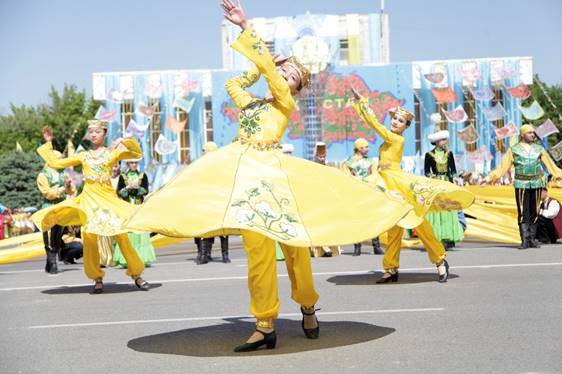Kazakhstan poised to spur development through comprehensive reforms

Last November, President of Kazakhstan Nursultan Nazarbayev unveiled the country’s new economic policy to date-Nurly Zhol (The Bright Road) which is geared towards stimulating job creation, propelling economic growth and fighting off global economic headwinds.
“The New Economic Policy will become a driver of the growth for our economy in the coming years. The policy will have a counter-cyclical character and will be aimed at continuing structural reforms in our economy,” said Nazarbayev.
“This is our global step on the path to become one of 30 most developed countries of the world,” the President noted.

Today, Kazakhstan is considered to be the most successful market reformer among the post-Soviet countries.
According to Roman Vakulchuk, a Ph.D. in economics and a senior research fellow at the Norwegian Institute of International Affairs in Oslo, Kazakhstan’s transition has been unique in many respects.
First, Kazakhstan’s economy was in crisis in the early 1990s, inflation reached four-digit figures, unemployment rates were high and future economic prospects were uncertain. However, since 2000, Kazakhstan has achieved high economic growth and the economic well-being of the population has steadily improved. The development and export of energy resources helped the country recover from the economic collapse of the 1990s.
Second, unlike other resource-rich countries, which usually restrict access to foreign investors, Kazakhstan has been open to foreign companies and investment from the very beginning.
Moreover, Kazakhstan has actively learned from the experiences of other countries in implementing economic policies. These measures helped to achieve progress in implementing market reforms.
Third, over the years of independence, a new culture of state-business interaction based on mutual dialogue has emerged in Kazakhstan. Despite existing difficulties in the private sector, many issues are solved successfully through this dialogue.
Since it became independent from the Soviet Union in December 1991, Kazakhstan has achieved major progress over the past two decades.
The country, which saw GDP contract by 11 per cent in 1991, has since seen a turnaround to GDP growth rates of 5.5 per cent in recent years. GDP per capita has also significantly increased in the past decade, and Kazakhstan achieved a significant reduction in poverty and remarkable improvements in social development indicators between 1995 and 2014.
Kazakhstan has a promising future in terms of strong fundamentals as a middle-income country well endowed with human capital and abundant natural resources. Kazakhstan’s achievements during its 24 years of independence (from 1991 when Kazakhstan declared independence from the Soviet Union and joins the Commonwealth of Independent States) demonstrate to the international investment community its ability to be a reliable partner with great economic potential.
According to the World Bank’s Doing Business 2014 survey, Kazakhstan has recently moved up to 50th out of 185 economies in terms of favorable conditions for business. Given the government’s efforts to speed up economic diversification as well as its willingness to attract more strategic investors, more foreign companies are expected to establish operations in the country.
Kazakhstan envisages celebrating the 550th Kazakh statehood anniversary in September 2015, as President Nazarbayev was quoted as saying ‘Celebration of the 550th anniversary of the Kazakh khanate is one of the most important events this year’.
The republic of Kazakhstan is located in the central part of the Eurasian continent, at an equal distance from the Atlantic and Pacific oceans.
The country is the ninth largest in the world and the fourth among the countries of Eurasia. Seven major European countries such as France, Spain, Sweden, Finland, Germany, Italy and the UK could be simultaneously accommodated in steppes of Kazakhstan, according to topographers.
Kazakhstan is neighboured by Russia, China and other Central Asian countries, such as Uzbekistan, Kyrgyzstan and Turkmenistan and also a considerable part of the border goes through the Caspian Sea.
The country is rich in oil and minerals, and according to many specialists, almost all elements of the periodic table could be found in Kazakh land.




What the stars mean:
★ Poor ★ ★ Promising ★★★ Good ★★★★ Very good ★★★★★ Exceptional
Latest News
More News
- Russian President congratulates Vietnamese Party leader during phone talks (January 25, 2026 | 09:58)
- Worldwide congratulations underscore confidence in Vietnam’s 14th Party Congress (January 23, 2026 | 09:02)
- Political parties, organisations, int’l friends send congratulations to 14th National Party Congress (January 22, 2026 | 09:33)
- 14th National Party Congress: Japanese media highlight Vietnam’s growth targets (January 21, 2026 | 09:46)
- 14th National Party Congress: Driving force for Vietnam to continue renewal, innovation, breakthroughs (January 21, 2026 | 09:42)
- Vietnam remains spiritual support for progressive forces: Colombian party leader (January 21, 2026 | 08:00)
- Int'l media provides large coverage of 14th National Party Congress's first working day (January 20, 2026 | 09:09)
- Vietnamese firms win top honours at ASEAN Digital Awards (January 16, 2026 | 16:45)
- ASEAN Digital Ministers' Meeting opens in Hanoi (January 15, 2026 | 15:33)
- ASEAN economies move up the global chip value chain (December 09, 2025 | 13:32)
















 Mobile Version
Mobile Version